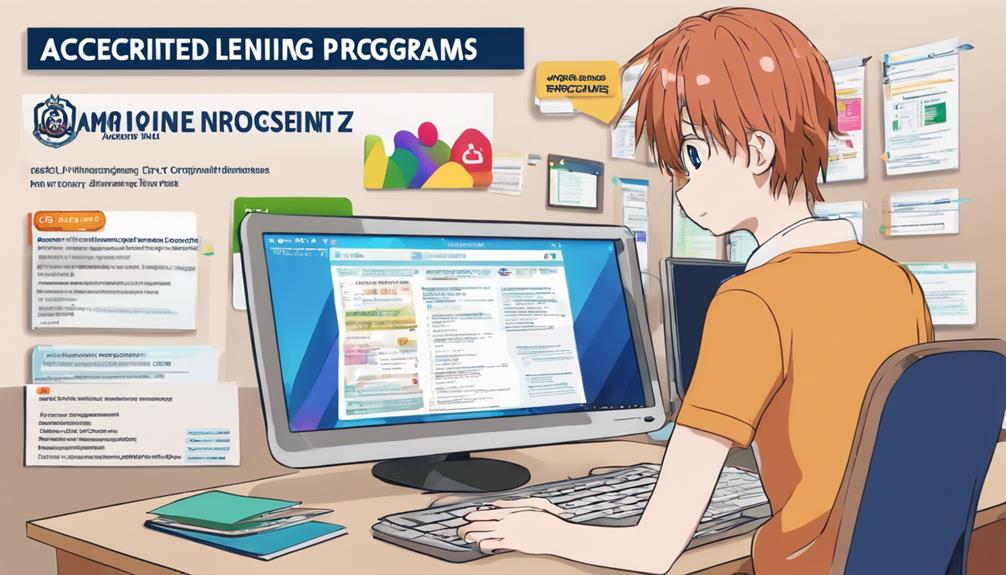How Do I Ensure Compliance With Online Learning Accreditation?
To guarantee compliance with online learning accreditation, you must be vigilant in understanding the standards, selecting the right accrediting body, and implementing quality assurance processes. Training faculty and staff on compliance, conducting regular self-assessment reviews, and staying updated on accreditation changes are also essential. By prioritizing these steps, you can navigate the complex landscape of accreditation requirements and elevate the quality of your online learning programs.
Key Takeaways
- Establish robust quality assurance processes for online programs.
- Conduct regular self-assessment reviews to identify areas for improvement.
- Assign a compliance officer to monitor and ensure accreditation updates.
- Implement necessary training programs for staff and faculty on compliance.
- Maintain thorough documentation of all accreditation-related activities.
Understanding Accreditation Standards
To comprehend accreditation standards fully, you must explore the specific criteria and requirements set forth by accrediting bodies. Accreditation requirements serve as industry benchmarks that institutions must meet to guarantee quality and consistency in education. These standards encompass compliance guidelines that address various aspects such as curriculum quality, faculty qualifications, student support services, and ethical practices.
Evaluation methods play a vital role in determining whether an institution meets these accreditation requirements. Accrediting bodies utilize a combination of self-assessment reports, site visits, interviews, and document reviews to establish compliance. These evaluation methods help verify that online learning programs maintain high standards of quality and effectiveness.
Selecting the Right Accrediting Body
When selecting the right accrediting body for your online learning institution, it's important to thoroughly review the accreditation criteria overview provided by each organization.
Additionally, consider the reputation of the accrediting bodies within your industry to make sure they align with your institution's goals and values.
Accreditation Criteria Overview
When contemplating selecting the right accrediting body for your online learning program, it is important to thoroughly review and understand the accreditation criteria. The accreditation process and requirements play a significant role in ensuring that your online learning program meets the necessary standards. Adequate preparation is key when it comes to accreditation documentation submission. Here is a table summarizing some key points to take into account:
| Criteria | Description | Importance |
|---|---|---|
| Accreditation Process | Understanding the steps involved | Guarantees compliance |
| Requirements | Meeting specific criteria | Demonstrates quality |
| Documentation | Providing necessary evidence | Supports accreditation |
Taking the time to comprehend these aspects will help you navigate the accreditation process successfully.
Accrediting Body Reputation
Selecting the right accrediting body for your online learning program requires careful consideration of the accrediting body's reputation. The accreditation credibility of the body you choose will greatly impact how your online program is perceived.
Research the accrediting bodies thoroughly to understand their accreditation process. Look into their history, the institutions they've accredited, and their standing in the academic community. Make sure that the accrediting body follows a rigorous accreditation process that aligns with industry standards.
A well-respected accrediting body will enhance the credibility of your online learning program and help students, employers, and other institutions trust the quality of education you provide. Make an informed decision to uphold the integrity and reputation of your online program.
Implementing Quality Assurance Processes
To guarantee the quality of online learning accreditation, establishing robust quality assurance processes is crucial. Continuous improvement is key in ensuring that online programs meet accreditation standards.
Implementing regular internal audits helps identify areas for enhancement and ensures ongoing compliance with accreditation requirements. These audits should be thorough, covering aspects such as curriculum quality, student assessment methods, faculty qualifications, and overall program effectiveness.
By conducting internal audits at regular intervals, institutions can proactively address any deficiencies and make necessary improvements to maintain accreditation status. It's vital to document these processes meticulously to demonstrate a commitment to quality assurance.
Additionally, involving key stakeholders in the review process can provide valuable insights and promote a culture of continuous quality enhancement. By prioritizing quality assurance through continuous improvement efforts and internal audits, institutions can uphold the standards required for online learning accreditation.
Training Faculty and Staff on Compliance
Training faculty and staff on compliance is vital for upholding accreditation standards in online learning programs. Compliance training guarantees that faculty members understand the regulations and requirements set forth by accrediting bodies. It equips staff with the knowledge and skills needed to maintain compliance throughout the institution.
Faculty development programs play an important role in educating instructors on best practices for online course delivery that align with accreditation standards. Policy enforcement training helps staff understand the importance of adhering to established guidelines and procedures to ensure ongoing compliance.
Assessment is a key component of compliance training, allowing institutions to evaluate faculty and staff understanding of accreditation requirements. Regular assessments help identify areas that may need additional training or support to maintain compliance. By investing in thorough compliance training and assessment programs, online learning institutions demonstrate their commitment to upholding accreditation standards and providing quality education to students.
This proactive approach not only safeguards accreditation status but also enhances the overall quality of the online learning experience.
Conducting Regular Self-Assessment Reviews
When conducting regular self-assessment reviews in online learning programs, you play a crucial role in guaranteeing ongoing compliance with accreditation standards. To begin, establish clear improvement strategies based on the identified areas for enhancement. Utilize performance metrics such as student outcomes, course completion rates, and instructor feedback to evaluate the effectiveness of your online learning programs.
During self-assessment reviews, focus on key areas like curriculum alignment with accreditation requirements, instructional quality, student support services, and technology infrastructure. Document all findings meticulously and prioritize implementing corrective actions promptly. Develop a structured plan to address any deficiencies and monitor progress consistently.
Engage faculty and staff in the self-assessment process to gather diverse perspectives and insights. Encourage a culture of continuous improvement by recognizing achievements and fostering innovation. Regular self-assessment reviews not only guarantee compliance but also drive quality enhancement in online learning, ultimately benefiting both the institution and its students.
Staying Updated on Accreditation Changes
Stay informed about changes in accreditation requirements to guarantee your online learning programs maintain compliance and quality standards. Keeping up-to-date with accreditation updates and compliance changes is vital for the success of your online learning initiatives. Here are four essential steps to help you stay on top of these updates:
- Regularly Check Accreditation Websites: Visit the websites of relevant accrediting bodies to stay informed about any new guidelines or changes in accreditation requirements.
- Attend Accreditation Workshops and Webinars: Participating in workshops and webinars hosted by accreditation agencies can provide valuable insights into upcoming changes and best practices for compliance.
- Join Professional Networks: Being part of professional networks within your industry can help you stay connected with peers who might share updates or insights regarding accreditation changes.
- Assign a Compliance Officer: Designate a specific individual within your organization to be responsible for monitoring and implementing accreditation updates, ensuring timely compliance with any new requirements.
Conclusion
As you navigate the intricate web of online learning accreditation, remember that compliance is like tending to a delicate garden. Just as a vigilant gardener nurtures each plant with care and precision, so too must you cultivate your institution's accreditation with attention to detail and dedication.
By staying vigilant, adapting to changes, and fostering a culture of continuous improvement, you can guarantee that your online learning programs blossom into thriving educational environments.







